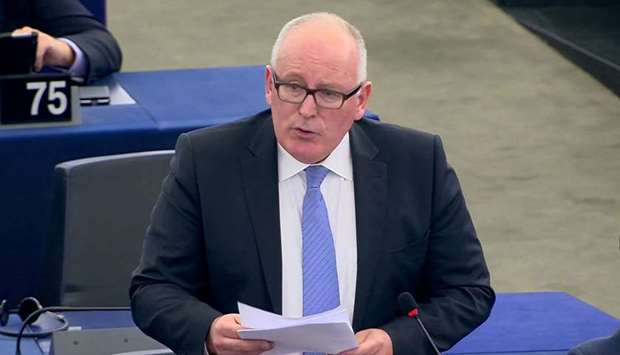“It’s time to talk,” the European Commission’s deputy head, Frans Timmermans, told the European Parliament during an emergency debate on the crisis in Spain.
Reflecting the cautiously balanced tone of a Commission statement on Monday after images of violent police action against an unauthorised independence referendum, Timmermans endorsed the legal position of Spanish Prime Minister Mariano Rajoy but also renewed an appeal for dialogue.
And despite “saddening” images of Spanish police beating participants in what the Commission says was an illegal vote, Brussels has no plan to accede to calls from the separatist government in Barcelona for direct EU mediation — Spain’s democratic systems are quite adequate for that, EU leaders say.
“You can work to change the law, but you cannot ignore the law,” Timmermans said in remarks aimed at Catalan leaders, who appear set on a unilateral declaration of independence in defiance of constitutional court rulings that forbid secession.
“Respect for the rule of law is not optional,” added First Vice President Timmermans, who also leads a Commission effort to prevent Poland’s right-wing government from changing judiciary regulations that the EU says is a move towards authoritarianism.
An EU lawmaker from Poland’s ruling party accused the EU of double standards for pressuring Warsaw but not Madrid — and several other eurosceptic and nationalist members also said the EU had not criticised Spanish police action firmly enough.
But Timmermans insisted it was not for Brussels to intervene: “The Commission has called on all relevant actors to now move quickly from confrontation to dialogue...
“It’s time to talk. To find a way out of the impasse, working within the constitutional order of Spain.”
Earlier yesterday, Spanish members of the EU parliament traded accusations over whether leaders in Barcelona or Madrid were responsible for the crisis.
At one point, one Spanish liberal lawmaker held up a copy of the post-dictatorship constitution, brandishing it at Catalan separatists and saying Catalans voted for it in 1978.
In the afternoon debate, leaders of the main parties in the Strasbourg chamber broadly echoed Timmermans’ arguments.
Few of Europe’s leaders want to see the disruption of splitting a major member state nor to encourage separatism in other countries.
The centre-right leader, the Bavarian Manfred Weber, and the liberal leader, the Flemish Guy Verhofstadt, both referred to their own origins to argue that strong regional identity and autonomy did not mean breaking up existing nation states.
“The irresponsible Catalan government is splitting the country,” said Weber, an ally of German Chancellor Angela Merkel and of Rajoy.
He said the EU had neither the will nor the means to intercede.
Some lawmakers, however, said Brussels could to more to help.
Greens leader Ska Keller, whose group includes pro-independence Catalans, said the Commission could act as “honest broker” to promote compromise.”It is wrong if the Commission shies away and continues to turn a blind eye.”
Verhofstadt, a Liberal former prime minister of Belgium where constitutional gymnastics and extreme devolution have prevented his fellow Flemings breaking with their French-speaking neighbours, chided Spaniards for failing to go beyond legal arguments to find genuine dialogue and compromise.
He called any declaration of independence “totally irresponsible” and said: “It’s not a shame to make compromises.”

